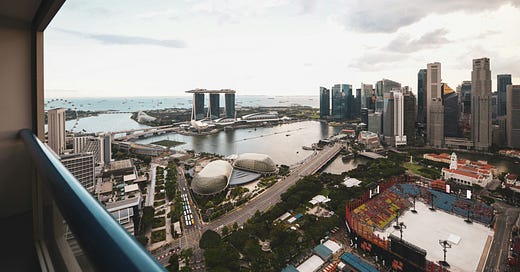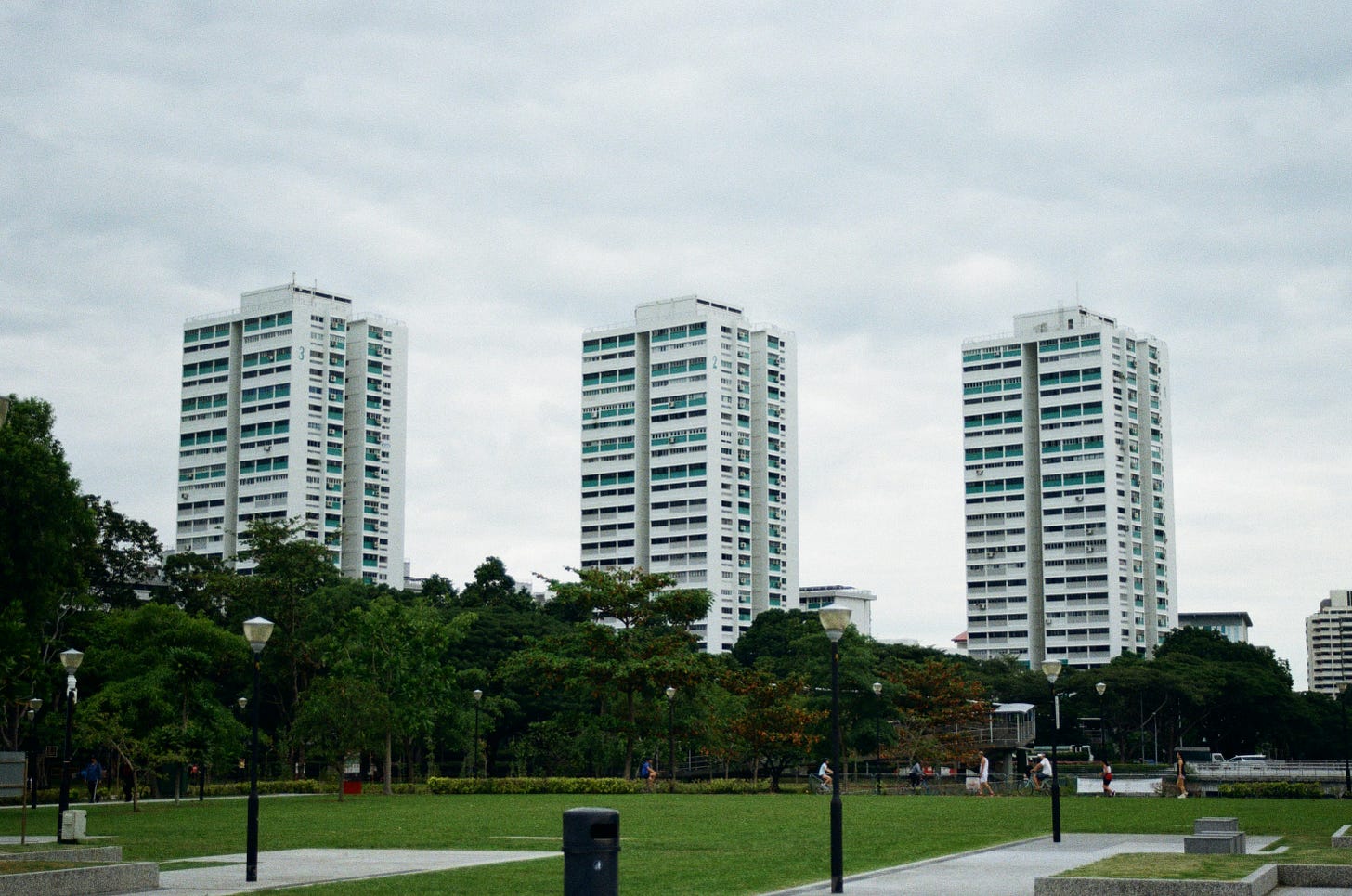How will party manifestoes shape the nine-day campaign? (The Nine Days, GE2025)
“It’s up to us MPs to make sure that peoples’ voices are heard in parliament.”
(Disclaimer: Opinions expressed are solely my own and do not express the views or opinions of the Singapore-based social service and non-profit organisations with whom I work or consult.)
Good morning, and Happy Nomination Day! Across the next nine days of campaigning (April 23 to May 1), at the end of each day, I’ll summarise the most important insights and developments. Because you’re likely to be inundated with news content, I’ll keep the newsletters snappy (hopefully 500 words or fewer!), with a heavier focus on social service and social policy issues.
Yesterday, I reflected on (new) candidates vis-à-vis their legislative aspirations, with hopes of candidate introductions being less banal. Today, before election hustings formally begin, I take a deeper dive into the party manifestoes of the ruling People’s Action Party (PAP) as well as the main opposition parties (i.e., the Workers’ Party, WP, Progress Singapore Party, PSP, and Singapore Democratic Party, SDP).
I had three overall thoughts, though the first may be unpopular. In summary, first, the PAP manifesto is not detailed, but it is entirely fit-for-purpose. Second, all four manifestoes centre bread-and-butter considerations, and the opposition parties have mooted meaningful policy proposals. Yet, to me, the main political contestation will pit “objective” macro-economic conditions against “subjective” Singaporean experiences about income inequality and social mobility. Finally, besides highlighting some social service and social policy proposals of interest, I’m excited to see how the manifestoes will translate into campaign messages across the next nine days, particularly for the opposition parties.
(Very, very usefully, independent journalist Kirsten Han has created a database which extracts policy proposals from the manifestoes of all political parties contesting in GE2025. Users can browse the proposals by theme and party. It’s an excellent resource for the election.)
PAP’s fit-for-purpose manifesto
First, the PAP did not need a more detailed manifesto, because the party can draw from the 2022 Forward SG Exercise (this is explicitly acknowledged in the manifesto), and – more crucially – it is campaigning on the government’s track record (more on that later). In other words, its manifesto is entirely fit-for-purpose. Its 12-word slogan, however, is a garbled mouthful: “Changed world, fresh team, new resolve – Securing a brighter future for you.”
The PAP manifesto consists of two parts. In the first, it referenced its GE2020 slogan – “Our Lives, Our Jobs, Our Future” – while making the case for its five-year track record: “Together we overcame a pandemic, battled inflation, revived our economy and refreshed our social compact.” In the second part, in each of the nine chapters, it specifies how policies will continue for respective groups of Singaporeans. For instance, in Chapter 3 (“For Every Singaporean – The Support That You Need”), lower-income families are promised support through ComLink+, an enhanced, post-Forward SG version of the Community Link (ComLink) scheme.
“Objective” and “subjective” economic evaluations
My second reflection about the four party manifestoes I read – including the PAP’s – is the obvious centrality of bread-and-butter considerations, especially since inflation and the cost of living are top of mind for Singaporean voters. The SDP leads with a focus on fair taxes, specifically a GST reduction, and its manifesto also proposes housing and healthcare policies. The first two sections of WP’s manifesto covers affordability and cost of living concerns as well as economic growth and opportunities. Similarly, the first four chapters of PSP’s manifesto is ordered as such: Cost of living, housing, jobs and wages, and social safety net.
Be that as it may, to me, GE2025 will primarily be contested around the following question: How will the parties juxtapose the “objective” macro-economic conditions (i.e., strong economic indicators) and “subjective” experiences about income inequality and social mobility? The PAP will point to strong data demonstrating Singapore’s economic success (i.e., higher household incomes and lower income inequality, as well as the country’s inflation growth hitting a four-year low). Conversely, the opposition parties will assert the following: If the macro-economic conditions are so good, why do some Singaporeans still feel bad about the economy?
Last year, in our podcast episode with Prof. Linda Lim of the University of Michigan, she explained this socio-economic tension, with obvious implications for political contestation:
“In Singapore, the problem is that the inequality people perceive and experience is not captured in statistics. We see increased numbers of rich people, especially foreigners, throwing their money around, buying whole floors of luxury [condominiums], fleets of luxury cars, luxury retail, while housing prices climb beyond my affordable range. My food and utility bills, hawker stall prices, go up, not to mention GST. I’m just not going to be happy …
I just want to be able to continue consuming what I consume, without it being priced out of my range, without having to constantly downsize. I don’t want to drive a Lamborghini. I just want a Grab ride to be affordable. I don’t want to eat at fancy high-end restaurants. I just want my chicken rice to have the same amount of chicken it had last week. I don’t want to live in Ridout Road or any GCB. I just want to be able to afford an HDB flat. I also want to be able to meet my aspirations for higher consumption in the future.”
How will the opposition parties make their case? You see it peppered throughout their manifestoes. They include arguments about how government taxes and transfers may have improved income inequality over time, but Singapore still compares poorly to other wealthy countries. There are references to wealth distribution and inequality. The SDP and PSP, in particular, emphasise fairness and dignity throughout their manifestoes.
How will party manifestoes shape the nine-day campaign?
Third, and finally, the burden was never on the opposition parties to publish extremely detailed policy proposals. In fact, generally and substantively, the manifestoes are very thoughtful. The parties and their candidates do not benefit from incumbency, and not being in power also means they do not have the resources of the civil service at their disposal. Even so, beyond the GST-related proposals, I spy a few recurring and interesting themes in relation to social service and social policy issues:
Strengthening existing social safety nets, including and beyond ComCare (for low-income Singaporeans) and Silver Support (for seniors). Interestingly, the PSP also calls on the government to “simplify the existing multiple overlapping support scheme system to a few national schemes.”
Calls for a national minimum or living wage, a policy which gained traction during GE2020 (and also, in my opinion, following the Minimum Income Standard study). The WP, PSP, and SDP are advocating for it, albeit at different wage levels. Relatedly, the WP reiterates its call for a national poverty line.
There are proposed policy intersections between poverty or inequality and education, with recommendations in the manifestoes to better support children from low-income families through tuition programmes (WP) as well as pre-schools and universities (SDP).
Finally, the WP advocates for a wealth tax: “Impose a net wealth tax of between 0.5 and 2 per cent on the assets of the top 1 per cent of wealth holders in the country.”
Evaluations of how these opposition party manifestoes will translate into campaign messages – as we get further away from the tangible policy proposals – are probably the most subjective (which is also why I’ve left this to the end). The most systematic way I could organise my reading notes was based on the party’s proximity to parliamentary representation.
The SDP doesn’t have an MP or NCMP, and thus its slogan, “Thrive, not just survive” reads like an aspirational rallying cry against the PAP, which has prioritised the country’s economic growth.
With its two NCMPs, the PSP’s “Progress for All” slogan is directly supported by its members’ active contributions in parliament, so as to dispense with the lazy narrative that opposition parties do not suggest alternatives.
The WP, like the PAP, includes in its manifesto a chapter of its ostensible impact on public policy. As the largest opposition party, its approach feels like a combination of the SDP’s and PSP’s, to marshal more voters to its cause, demonstrate its legislative contributions, and make the case that additional political diversity is much needed.
What’s more likely, I think, is that the opposition parties will wait for the PAP to stake its electoral campaign position more clearly, before framing and fine-tuning their messages in response.
“It’s up to us MPs to make sure that peoples’ voices are heard in parliament”
On a final, sad note, former MP Louis Ng – the most active parliamentarian in the 14th term of parliament – announced that he will not be contesting in GE2025. The two-term MP is stepping away for family reasons, and despite interventions by Law and Home Affairs minister K Shanmugam and prime minister Lawrence Wong.
By all accounts, Mr. Ng’s presence will be missed by his residents. His voice will also be missed in parliament, including by social workers. We’ve hosted him twice on the socialservice.sg podcast, and both episodes highlighted just how seriously he took his responsibilities. In January 2022, as a leading legislative voice on the work and welfare of the Singaporean social worker, he shared about his public consultation initiative, which covered emerging issues around pay and compensation, burnout and retention, case management and caseload ratio, as well as community work.
And in July 2023, as his active parliamentary engagement gained public attention and traction, we quizzed Mr. Ng about how he engaged legislative assistants – hired using an MP allowance – to help him with parliamentary questions and quizzes. He gamely shared about his motivations, the process behind drafts and re-drafts, and how he and his team integrated feedback from walkabouts. In that spirit, I leave you with the following quote from the episode:
“It’s up to us MPs to make sure that peoples’ voices are heard in parliament. And that’s why I focus not just on bread-and-butter issues, but, importantly, making sure that those who are marginalised get a voice as well.”






garbled mouthful of a slogan indeed ha no best practices at all :')